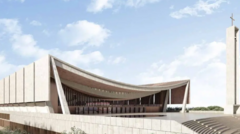In a move that underscores the challenges Ghana faces, President John Mahama declared an investigation into the proposed $400 million National Cathedral, a project begun under former President Nana Akufo-Addo. The project's funding mechanism and cost have come under scrutiny, especially as Ghana grapples with severe economic hardships.
The cathedral, intended as a symbol of national unity and spirituality, promises to host diverse religious events, encompass a Bible museum, and serve as a conference center. However, much of the criticism revolves around prioritizing the construction over urgent healthcare and educational needs.
President Mahama, announcing the audit at a recent thanksgiving service, stated, “We would soon activate such an investigation into the project,” while considering a reassessment of the project's budget amid the nation’s financial strains. The president also emphasized the need to possibly relocate the site to better manage costs.
Earlier, the previous government claimed the cathedral would be privately funded, yet taxpayer funds up to $58 million have already been allocated to the venture, resulting in a massive hole on valuable land in Accra, which had once housed government buildings and residences.
Public sentiment towards the project remains divisive. Critics within Ghana, including NDC lawmaker Kwabena Mintah Akandoh, have voiced concerns about the impracticality of such a project during a time of dire need, labeling it as a misallocation of resources.
The Finance Minister, Cassiel Ato Forson, reinforced this sentiment by stating that government funds would no longer support the cathedral, echoing calls to eliminate wasteful expenditures. As inflation sits high at 23.8%, and critical services suffer from shortages, these financial discussions resonate strongly with the electorate.
The cathedral project's construction has stalled amid financial disputes with contractors, who have ceased operations due to unpaid debts. This situation has led to significant concerns from within the cathedral's planning committee, resulting in resignations from board members advocating for project reassessment and potential cancellation.
As Ghana continues to navigate its economic trials, the fate of the National Cathedral hangs in the balance, reflecting broader questions of governance, economic priorities, and the role of religious symbolism in national identity.
The cathedral, intended as a symbol of national unity and spirituality, promises to host diverse religious events, encompass a Bible museum, and serve as a conference center. However, much of the criticism revolves around prioritizing the construction over urgent healthcare and educational needs.
President Mahama, announcing the audit at a recent thanksgiving service, stated, “We would soon activate such an investigation into the project,” while considering a reassessment of the project's budget amid the nation’s financial strains. The president also emphasized the need to possibly relocate the site to better manage costs.
Earlier, the previous government claimed the cathedral would be privately funded, yet taxpayer funds up to $58 million have already been allocated to the venture, resulting in a massive hole on valuable land in Accra, which had once housed government buildings and residences.
Public sentiment towards the project remains divisive. Critics within Ghana, including NDC lawmaker Kwabena Mintah Akandoh, have voiced concerns about the impracticality of such a project during a time of dire need, labeling it as a misallocation of resources.
The Finance Minister, Cassiel Ato Forson, reinforced this sentiment by stating that government funds would no longer support the cathedral, echoing calls to eliminate wasteful expenditures. As inflation sits high at 23.8%, and critical services suffer from shortages, these financial discussions resonate strongly with the electorate.
The cathedral project's construction has stalled amid financial disputes with contractors, who have ceased operations due to unpaid debts. This situation has led to significant concerns from within the cathedral's planning committee, resulting in resignations from board members advocating for project reassessment and potential cancellation.
As Ghana continues to navigate its economic trials, the fate of the National Cathedral hangs in the balance, reflecting broader questions of governance, economic priorities, and the role of religious symbolism in national identity.


















